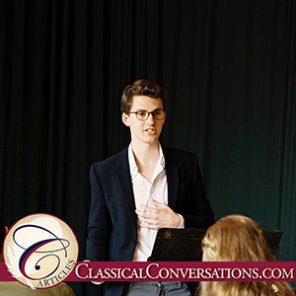The opinions in this article are the author’s and do not necessarily represent the views or opinions of Classical Conversations and its leadership, staff, or communities. We are glad to provide a platform for discussion of ideas about classical Christian education in K-12 education and beyond, but publication is not an endorsement from Classical Conversations.
During the last year, college campuses across the United States have become the front lines of a massive cultural clash. On one side, we see a generation of students who angrily demand abject apologies and resignations, increased funding for their various causes, and “safe spaces.” On the other side of this clash we see university administrators who seem to find no principled reason in themselves to object to these demands, and who therefore march in a slow retreat of acquiescence. It is a sad and terrifying sight to behold.
And yet, though I hold the position of college president, a position that is increasingly trotted out as the preferred scapegoat to be slaughtered in appeasement of the rioting crowds, I find myself relatively unconcerned. The first and most obvious reason I am not too worried about these troubled times is that my trust ultimately is in the living God and not in the fickle will of a mob. Second, I already see at work in our nation another generation, one that is being raised up with an entirely different character. And I see as the common denominator that brands this other generation their classical Christian K-12 education.
Almost all the students of New Saint Andrews College, where I serve as president, come to us with a classical Christian education of one sort or another, some from classical Christian schools and some from homeschooling families who use a classical Christian curriculum. The results of this education are striking. As a college, we can do so much more with these students because of the foundational education they were given before they arrived at our doors.
For instance, our students welcome the intellectual challenges that we intentionally serve up to them. The unfortunate impulse of many students today is to assume that when they struggle with something, the world needs to change so that the student’s struggle can stop. American children in general seem to be catechized to respond with resentment and protests when they encounter a challenge. But there is something about spending your education in the shadows of the great minds of the western tradition that helps students see that their own mental abilities do not form a boundary beyond which the testable material must not wander.
Our students understand that they have enrolled in college in order to be stretched beyond what they previously thought of as the limits of their capability. And they willingly sign up for this because they have already experienced it at the primary and secondary levels. They have already developed the ability to read larger works, to argue coherently about them, to write in prose that is both logically precise and rhetorically winsome. They have already experienced real intellectual rigor in their classical Christian education and have found that they won’t be satisfied at a college that demands any less of them.
And on top of all this, the classical Christian education that our students received at home has already instilled in them a love of their subjects. What a blessing it is to speak to a classroom of students who are passionate about the topic of discussion. And that is who classical Christian educators have filled our classrooms with—students who love the material and love seeing the glory of God in the world that He has created.
When you are in the trenches of educating your children, making many sacrifices to give your sons and daughters the kind of education you yourself never had, it’s easy to get discouraged. Please know, however, that what you are doing is truly making a difference. I see it clearly every year in each new freshman class at New Saint Andrews. And I am not bragging when I say that, because this difference clearly isn’t something that we magically impart to them as they enroll here. They arrive already different because of their classical Christian education.
There are two reasons why I am exhorting you in this direction. First my faculty are going to spend the next eight months encouraging you in the classics and hopefully demonstrating their love for this topic (Classical Conversations is allowing us to contribute one article per month through May).
Secondly because there is bad news involved. The bad news is that this wonderful classical Christian education you have given to your children may have ruined them for college, or at least for most colleges. You see, given the K-12 education that you have already provided to them, given their ability to think clearly and communicate with precision, given their love of the material that they are studying and their desire to see the glory of God in all things, you may find that there are very few colleges that actually serve as a suitable next step in their education. So, let me challenge you not to stop stretching them when they complete grade 12. There is a whole other level of academic rigor that your students are ready for as they move into college. Please take the time to find a worthy successor for your students’ education for which you already sacrificed so much. And if you need any help finding colleges like this, don’t hesitate to stop by northern Idaho and see if we can help.
Fellow of Theology Dr. Ben Merkle is the second President of New Saint Andrews College. Dr. Merkle is the author of The White Horse King: The Life of Alfred the Great and Defending the Trinity in the Reformed Palatinate: The Elohistae. He is a contributing editor and former managing editor of the periodical Credenda/Agenda. He and wife Bekah have five children.




